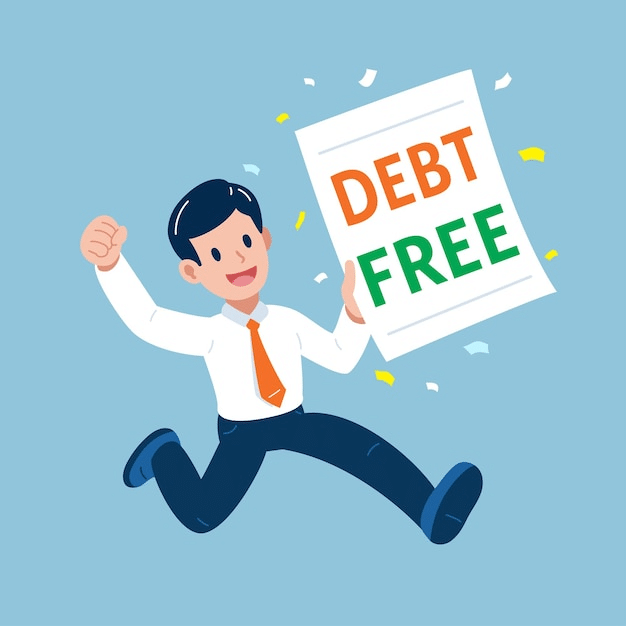Essential habits for debt-free living

In the current financial landscape, living without debt has become a pivotal goal for many. This blog post sheds light on essential habits that pave the way for a debt-free lifestyle. Embracing these practices allows for financial freedom and significantly reduces monetary stress.
By adopting strategies that focus on spending wisely, saving diligently, and planning for the future, individuals can transform their relationship with money. This transition not only helps in eliminating existing debt but also prevents the accumulation of new financial burdens.
Let's explore the habits that are fundamental to achieving and maintaining a state of financial independence, ensuring a debt-free life.
Understanding and Tracking Your Spending
One of the core debt-free habits is to have a clear understanding of where your money is going. Track your expenses meticulously to identify areas where you can cut back. This visibility is crucial in setting realistic budgets.
Utilizing budgeting apps or simply keeping a spreadsheet can greatly aid in this process. Awareness of spending enables more informed financial decisions and prevents overspending.
Budgeting should not be perceived as a restriction, but as a means to achieve financial goals.
Creating an Emergency Fund
Unexpected expenses can derail your financial stability and push you towards debt. Establishing an emergency fund acts as a financial buffer against unforeseen expenditures.
Start small, if necessary, and gradually increase your savings until you have enough to cover at least three to six months of living expenses. This fund eliminates the need to borrow in case of emergencies.
Reducing Unnecessary Expenditures
Evaluate your spending habits and identify areas where you can cut back. Luxuries and non-essential expenses are often the first areas to consider. Adopting a frugal lifestyle doesn’t mean you have to sacrifice everything; it’s about making smarter financial choices.
Allocating funds towards debt repayment or savings rather than unnecessary expenditures accelerates the journey to a debt-free life.
Building Multiple Income Streams
Increasing your income is equally important as reducing expenses. Seek opportunities for side hustles, freelance work, or any legal means to earn additional revenue. More income translates to more resources for clearing debts and saving.
Incorporating Savings into Your Budget
Savings should be a non-negotiable part of your financial plan. Prioritize saving a portion of your income before allocating funds to expenses. This habit not only fosters a strong savings culture but also reduces the likelihood of falling into debt.
Investing Wisely
Investing is a debt-free habit that can lead to long-term financial gain. However, it’s crucial to do thorough research or consult with a financial advisor before making any investments. The right investments can offer passive income and financial security.
Avoiding Impulsive Purchases
Impulse buying can quickly undo financial discipline. Always take time to consider the necessity and value of a purchase. Waiting a day or two before buying can often reduce the urge to make unnecessary purchases.
Using Credit Wisely
Credit can be a tool or a trap. Using credit cards responsibly — paying off balances in full each month — can benefit your credit score without accruing interest. However, relying on credit for everyday expenses can lead to debt accumulation.
Setting Clear Financial Goals
Knowing what you’re striving for financially can guide your spending and saving habits. Whether it’s buying a home, starting a business, or simply becoming debt-free, clear goals provide motivation and a roadmap for financial decisions.
Educating Yourself about Personal Finance
Knowledge is power, especially in finance. Investing time in understanding financial principles, debt management strategies, and investment options empowers you to make informed decisions. Resources are abundantly available in books, online courses, and financial blogs.
{FAQ}
{FAQ_ITEM}
{FAQ_TITULO}How much should I save in my emergency fund?{/FAQ_TITULO}
{FAQ_CONTEUDO}Aim to save at least three to six months’ worth of living expenses to provide a comfortable buffer against unforeseen financial needs.{/FAQ_CONTEUDO}
{/FAQ_ITEM}
{FAQ_ITEM}
{FAQ_TITULO}Is it okay to use credit cards if I want to live debt-free?{/FAQ_TITULO}
{FAQ_CONTEUDO}Yes, as long as you use them responsibly by paying off the full balance each month to avoid interest charges and debt accumulation.{/FAQ_CONTEUDO}
{/FAQ_ITEM}
{FAQ_ITEM}
{FAQ_TITULO}Can investing help me live debt-free?{/FAQ_TITULO}
{FAQ_CONTEUDO}Yes, wise investments can generate additional income and help build wealth, contributing to a debt-free lifestyle. However, it’s important to invest within your means and knowledge level.{/FAQ_CONTEUDO}
{/FAQ_ITEM}
{/FAQ}
Conclusion
Living a debt-free life is achievable by incorporating specific habits into your financial routine. From tracking your spending and building an emergency fund to investing wisely and using credit responsibly, each habit plays a vital role in achieving financial independence.
Remember, the key to successful debt-free living lies in awareness, discipline, and a proactive approach to personal finance. Start implementing these habits today, and pave your way to a more secure and prosperous financial future.
While the journey might require sacrifices and adjustments, the peace of mind and freedom that come from living debt-free are unparalleled benefits that last a lifetime.

Related